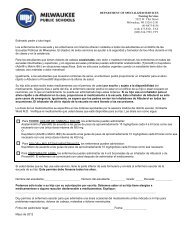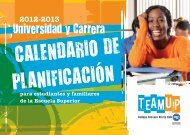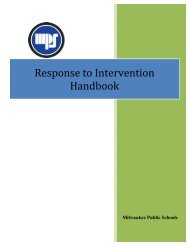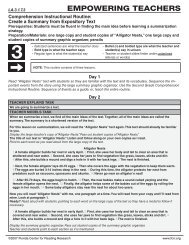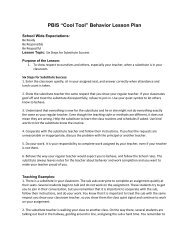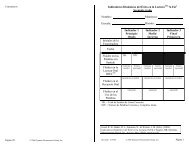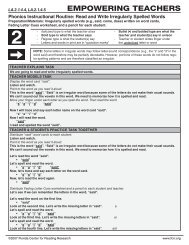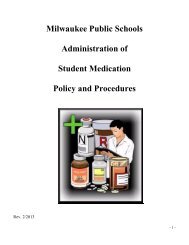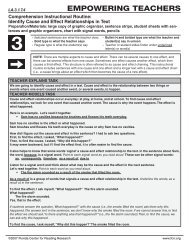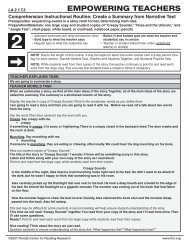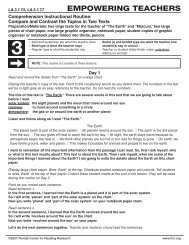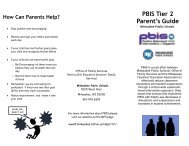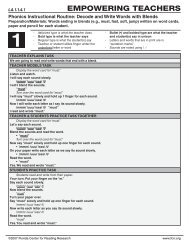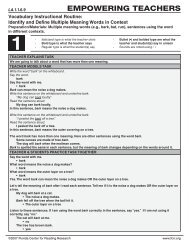Identify the Main Idea from Text
Identify the Main Idea from Text
Identify the Main Idea from Text
You also want an ePaper? Increase the reach of your titles
YUMPU automatically turns print PDFs into web optimized ePapers that Google loves.
LA.1.1.7.3<br />
EMPOWERING TEACHERS<br />
Listening/Reading Comprehension Instructional Routine:<br />
<strong>Identify</strong> <strong>the</strong> <strong>Main</strong> <strong>Idea</strong> <strong>from</strong> <strong>Text</strong><br />
Preparation/Materials: large teacher copy of all stories (#1, #2, and #3), student copies of stories #2<br />
and #3<br />
1<br />
-<br />
-<br />
-<br />
Italicized sentences are what <strong>the</strong> teacher does<br />
Bold type is what <strong>the</strong> teacher says<br />
Regular type is what <strong>the</strong> student(s) say<br />
TEACHER EXPLAINS TASK<br />
We are going to identify <strong>the</strong> main idea in a paragraph. The main idea is <strong>the</strong> most important information about <strong>the</strong><br />
topic. When we know <strong>the</strong> main idea, it helps us to remember and retell what we read.<br />
TEACHER SETS UP TASK<br />
Sentences in a paragraph are related by a topic. The topic is who or what <strong>the</strong> paragraph is about. The sentences in<br />
<strong>the</strong> paragraph provide details or more information about <strong>the</strong> topic.<br />
The main idea is usually one of <strong>the</strong> sentences in <strong>the</strong> paragraph. However, sometimes <strong>the</strong>re is not a main idea<br />
sentence. Then we must figure out <strong>the</strong> main idea based on <strong>the</strong> details or information in <strong>the</strong> paragraph.<br />
Suppose you heard your friends reading a paragraph about alligators. The topic would be ‘alligators’. If <strong>the</strong> topic of<br />
<strong>the</strong> paragraph is about alligators and <strong>the</strong> details tell us about <strong>the</strong>ir size, <strong>the</strong>n <strong>the</strong> main idea might be ‘alligators are<br />
big reptiles.’<br />
Listen and follow along as I read Story #1. After reading, I will find <strong>the</strong> topic and <strong>the</strong> main idea. Point to each word as<br />
you read aloud <strong>from</strong> <strong>the</strong> large copy of <strong>the</strong> text.<br />
#1. The boys are making pizza. Tom rolled out <strong>the</strong> pizza dough. Jose spread sauce on top of <strong>the</strong> dough. Martin<br />
added sausage and cheese to <strong>the</strong> pizza. Now <strong>the</strong> pizza was ready to bake.<br />
To find <strong>the</strong> topic, I ask: “Who or what is <strong>the</strong> paragraph about?”<br />
The paragraph is about pizza. So, <strong>the</strong> topic of this paragraph is ‘pizza’.<br />
To find <strong>the</strong> main idea, I ask: “What is <strong>the</strong> most important information <strong>the</strong> author wants me to know about <strong>the</strong> topic<br />
which is ‘pizza’?”<br />
The author has written that one boy rolled out <strong>the</strong> pizza dough, ano<strong>the</strong>r boy put sauce on top, and <strong>the</strong> third boy<br />
added sausage and cheese to <strong>the</strong> pizza.<br />
So <strong>the</strong> most important information or <strong>the</strong> main idea is ‘<strong>the</strong> boys are making pizza’.<br />
Can I find this main idea sentence in <strong>the</strong> story?<br />
Yes. The main idea is often <strong>the</strong> first sentence in <strong>the</strong> paragraph, but it isn’t always <strong>the</strong> first sentence. There may<br />
not even be a main idea sentence in <strong>the</strong> paragraph. Then, I have to figure out <strong>the</strong> main idea based on <strong>the</strong> o<strong>the</strong>r<br />
information in <strong>the</strong> paragraph.<br />
Let’s try <strong>the</strong> next one toge<strong>the</strong>r.<br />
TEACHER AND STUDENTS PRACTICE TASK TOGETHER<br />
Remember, <strong>the</strong> topic is who or what <strong>the</strong> paragraph is about.<br />
What is <strong>the</strong> topic?<br />
• The topic is who or what <strong>the</strong> paragraph is about.<br />
The main idea of a paragraph is <strong>the</strong> most important information about <strong>the</strong> topic.<br />
What is <strong>the</strong> main idea of a paragraph?<br />
• The main idea is <strong>the</strong> most important information about <strong>the</strong> topic.<br />
The o<strong>the</strong>r sentences in a paragraph are details about <strong>the</strong> topic.<br />
A detail is part of <strong>the</strong> information about <strong>the</strong> topic.<br />
What is a detail?<br />
• A detail is part of <strong>the</strong> information about <strong>the</strong> topic.<br />
©2007 Florida Center for Reading Research www.fcrr.org<br />
-<br />
-<br />
Bullet (•) and bolded type are what <strong>the</strong> teacher and<br />
student(s) say in unison<br />
Teacher or student slides finder under underlined letter(s)<br />
or word(s)
EMPOWERING TEACHERS<br />
TEACHER AND STUDENTS PRACTICE TASK TOGETHER (continued)<br />
The main idea can be one of <strong>the</strong> sentences in <strong>the</strong> paragraph. If <strong>the</strong>re is not a main idea sentence, <strong>the</strong>n we figure out<br />
<strong>the</strong> main idea based on <strong>the</strong> details or information in <strong>the</strong> paragraph.<br />
Name one way to find <strong>the</strong> main idea?<br />
• We look for a sentence in <strong>the</strong> paragraph to find <strong>the</strong> main idea.<br />
Name ano<strong>the</strong>r way to find <strong>the</strong> main idea when <strong>the</strong>re is not a main idea sentence in <strong>the</strong> paragraph.<br />
• We figure out <strong>the</strong> main idea based on <strong>the</strong> information in <strong>the</strong> paragraph.<br />
Get ready to listen to a new story. Pass out copies of story #2.<br />
Think about who or what <strong>the</strong> paragraph is about to find <strong>the</strong> topic.<br />
What are we going to think about first?<br />
• We are going to think about who or what <strong>the</strong> paragraph is about.<br />
Next, think about <strong>the</strong> most important information <strong>the</strong> author wants you to know about <strong>the</strong> topic.<br />
What are we going to think about next?<br />
• We are going to think about <strong>the</strong> most important information about <strong>the</strong> topic.<br />
Look at story #2 and follow along as I read it aloud. Point to each word as you read aloud <strong>from</strong> <strong>the</strong> large copy of <strong>the</strong> text.<br />
Story #2. When Travis goes to visit his grandmo<strong>the</strong>r, he usually swims in her swimming pool. Sometimes he swims<br />
or floats in an inner tube down <strong>the</strong> nearby river. However, <strong>the</strong> next time he goes to visit his grandmo<strong>the</strong>r, <strong>the</strong>y are<br />
going to swim in <strong>the</strong> ocean.<br />
To find <strong>the</strong> topic, ask: who or what is <strong>the</strong> paragraph about?<br />
Travis is who <strong>the</strong> paragraph is about and swimming is what <strong>the</strong> paragraph is about. Now we have to figure out<br />
which one is <strong>the</strong> topic.<br />
Does <strong>the</strong> paragraph tell us more about Travis?<br />
• No<br />
Does <strong>the</strong> paragraph tell us more about swimming or where to swim?<br />
• Yes<br />
That’s right. The sentences in <strong>the</strong> paragraph provide more information about swimming.<br />
The topic is ‘swimming’.<br />
What is <strong>the</strong> topic?<br />
• The topic is swimming.<br />
To find <strong>the</strong> main idea, ask: what is <strong>the</strong> most important information about swimming?<br />
The main idea is ‘Travis swims in many places.’<br />
What is <strong>the</strong> main idea?<br />
• Travis swims in many places.<br />
Is this main idea sentence in <strong>the</strong> paragraph?<br />
• No.<br />
That’s right. The sentence, ‘Travis swims in many places’ is not in <strong>the</strong> paragraph.<br />
We had to figure out th emain idea based on <strong>the</strong> o<strong>the</strong>r information in <strong>the</strong> paragraph.<br />
So, how did you figure out <strong>the</strong> main idea?<br />
• We had to figure out <strong>the</strong> main idea based on <strong>the</strong> o<strong>the</strong>r information in <strong>the</strong> paragraph.<br />
Each sentence tells us about one of <strong>the</strong> places to go swimming. The main idea tells us about swimming in many<br />
places.<br />
STUDENTS PRACTICE TASK<br />
We are going to identify <strong>the</strong> topic and <strong>the</strong> main idea in ano<strong>the</strong>r paragraph. Remember, <strong>the</strong> main idea is <strong>the</strong> most<br />
important information about <strong>the</strong> topic.<br />
What is <strong>the</strong> topic in a paragraph?<br />
The topic is who or what <strong>the</strong> paragraph is about.<br />
What is <strong>the</strong> main idea in a paragraph?<br />
The main idea is <strong>the</strong> most important information about <strong>the</strong> topic.<br />
The main idea can be one of <strong>the</strong> sentences in <strong>the</strong> story. If it is not <strong>the</strong>re, we have to figure out <strong>the</strong> main idea based<br />
on <strong>the</strong> details or information in <strong>the</strong> paragraph.<br />
©2007 Florida Center for Reading Research www.fcrr.org
STUDENTS PRACTICE TASK (continued)<br />
EMPOWERING TEACHERS<br />
Name one way to find <strong>the</strong> main idea.<br />
Look for a sentence in <strong>the</strong> story that tells us <strong>the</strong> most important information about <strong>the</strong> topic.<br />
Name ano<strong>the</strong>r way to find <strong>the</strong> main idea when it is not a sentence in <strong>the</strong> paragraph.<br />
Figure out <strong>the</strong> main idea based on <strong>the</strong> information in <strong>the</strong> story.<br />
Get ready to listen to a new story. Pass out copies of story #3.<br />
What are you going to think about first to find <strong>the</strong> topic?<br />
I am going to think about who or what <strong>the</strong> story is about.<br />
Yes, think about who or what <strong>the</strong> story is about to find <strong>the</strong> topic.<br />
What are you going to think about next to find <strong>the</strong> main idea?<br />
I am going to think about <strong>the</strong> most important information about <strong>the</strong> topic.<br />
Yes, think about <strong>the</strong> most important information <strong>the</strong> author wants you to know about <strong>the</strong> topic.<br />
Find story #3 and follow along as I read it aloud. Point to each word as you read aloud <strong>from</strong> <strong>the</strong> large copy of <strong>the</strong> text.<br />
Story #3. We usually see water as a liquid. We drink and swim in liquid water. Sometimes <strong>the</strong> water gets very cold<br />
and turns to ice. When water becomes hard and frozen solid, it is ice. Ice cubes are a solid form of water. When <strong>the</strong><br />
ice cubes melt, <strong>the</strong> water becomes a liquid again. Sometimes <strong>the</strong> water becomes very hot and turns to a gas. When<br />
water becomes a gas it disappears into <strong>the</strong> air. The clouds in <strong>the</strong> sky are made of this gas or water vapor. Water can<br />
be a liquid, solid, or gas.<br />
To find <strong>the</strong> topic, ask who or what is <strong>the</strong> paragraph about.<br />
What is <strong>the</strong> topic or what is <strong>the</strong> paragraph about?<br />
It is about water.<br />
To find <strong>the</strong> main idea, ask what is <strong>the</strong> most important information about water.<br />
What information did we learn about water?<br />
We learned that water can be a liquid, a solid, or a gas.<br />
Yes, this sentence tells <strong>the</strong> most important information about <strong>the</strong> topic in this paragraph.<br />
Could this be <strong>the</strong> main idea sentence?<br />
Yes.<br />
Is this sentence in <strong>the</strong> story?<br />
Yes.<br />
Where is this sentence in <strong>the</strong> story?<br />
It is <strong>the</strong> last sentence.<br />
That’s right. You did a great job of finding <strong>the</strong> main idea.<br />
INDEPENDENT PRACTICE<br />
When students consistently identify <strong>the</strong> topic and main idea, provide individual turns using o<strong>the</strong>r explicit passages.<br />
SCAFFOLDING SUGGESTION FOR ERRORS<br />
Verify that students are correctly identifying <strong>the</strong> topic and main idea. If students are experiencing difficulty with this<br />
concept, use fewer sentences in a paragraph and provide a chart that has a column for topic and a column for <strong>the</strong> most<br />
important information about that topic to find <strong>the</strong> main idea.<br />
Adaptations using this Instructional Routine:<br />
• Provide copies of a paragraph <strong>from</strong> familiar, decodable text. Ask students to answer <strong>the</strong> two questions on <strong>the</strong> graphic<br />
organizer attached to this routine.<br />
• Have students listen to a simple recorded text. Ask students to identify <strong>the</strong> topic and main idea after listening.<br />
For fur<strong>the</strong>r independent practice with identifying <strong>the</strong> main idea, refer to <strong>the</strong> following Kindergarten and<br />
First Grade FCRR Student Center Activities at<br />
http://www.fcrr.org/Curriculum/pdf/GK-1/Archive/C_Final.pdf<br />
• C.026 (do not use <strong>the</strong> summarizing part of this activity)<br />
• C.027<br />
• C.028<br />
• C.029<br />
©2007 Florida Center for Reading Research www.fcrr.org
EMPOWERING TEACHERS<br />
1. The boys are making pizza. Tom rolled out <strong>the</strong> pizza dough. Jose<br />
spread sauce on top of <strong>the</strong> dough. Martin added sausage and<br />
cheese to <strong>the</strong> pizza. Now <strong>the</strong> pizza was ready to bake.<br />
2. When Travis goes to visit his grandmo<strong>the</strong>r, he usually swims in<br />
her swimming pool. Sometimes he swims or floats in an inner tube<br />
down <strong>the</strong> nearby river. However, <strong>the</strong> next time he goes to visit his<br />
grandmo<strong>the</strong>r, <strong>the</strong>re are going to swim in <strong>the</strong> ocean.<br />
3. We usually see water as a liquid. We drink and swim in liquid<br />
water. Sometimes <strong>the</strong> water gets very cold and turns to ice. When<br />
water becomes hard and frozen solid, it is ice. Ice cubes are a solid<br />
form of water. When <strong>the</strong> ice cubes melt, <strong>the</strong> water becomes a liquid<br />
again. Sometimes <strong>the</strong> water becomes very hot and turns to a gas.<br />
When water becomes a gas it disappears into <strong>the</strong> air. The clouds<br />
in <strong>the</strong> sky are made of this gas or water vapor. Water can take <strong>the</strong><br />
form of a liquid, solid or gas.<br />
©2007 Florida Center for Reading Research www.fcrr.org
EMPOWERING TEACHERS<br />
Who or what is <strong>the</strong> paragraph about?<br />
Tell <strong>the</strong> most important thing about<br />
<strong>the</strong> who and what.<br />
Tell <strong>the</strong> main idea of <strong>the</strong> paragraph<br />
in 10 words or less.<br />
©2007 Florida Center for Reading Research www.fcrr.org



